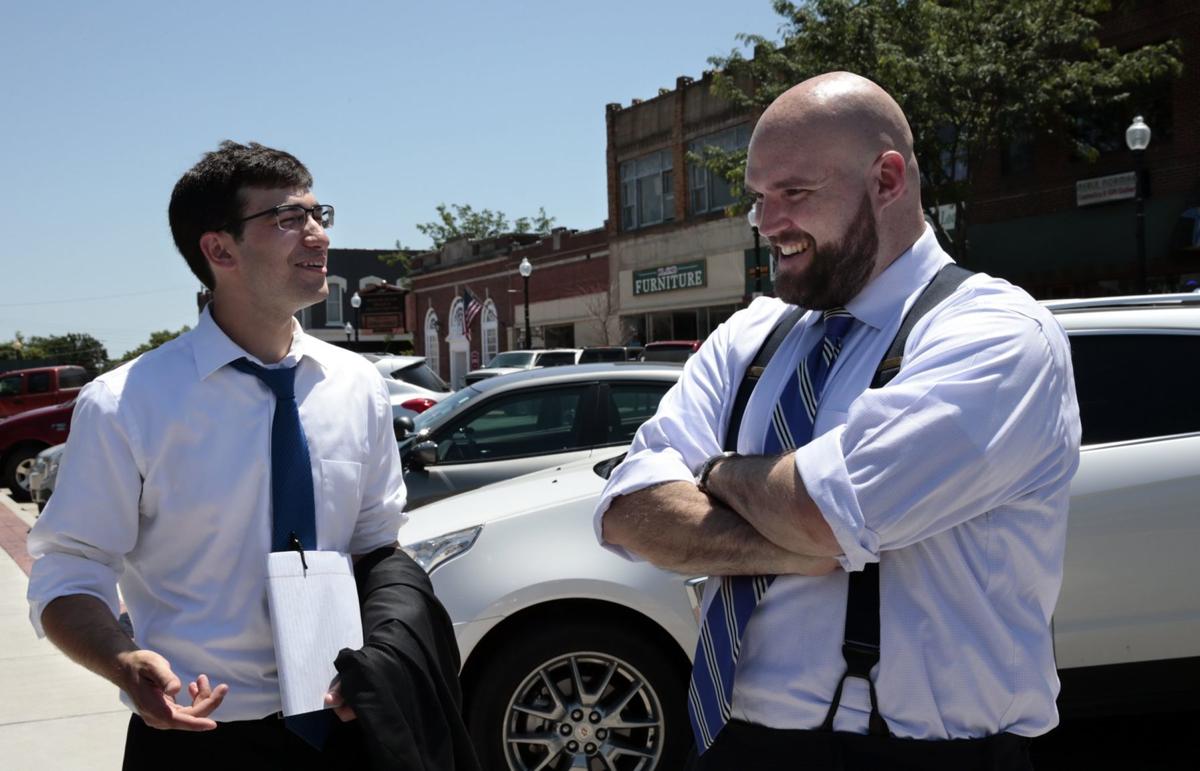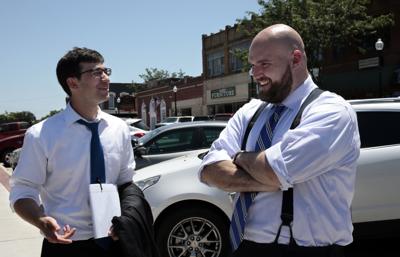The court reporter asked David Roland to speak up.
His soft voice belies the Mexico, Mo., attorneyŌĆÖs burly physique. With his bald head and thick beard, Roland looks like a lumberjack in a suit.
On Wednesday, he was taking a few whacks with his rhetorical ax at MissouriŌĆÖs long-standing love affair with government secrecy.
ŌĆ£This case is about transparency and accountability,ŌĆØ he said in his opening argument in a trial before Judge Mark Neill in the Civil Courts building in downtown ├█č┐┤½├Į. Roland, co-founder and director of litigation for , is representing recent law school graduate Aaron Malin, who three years ago filed Sunshine Law requests with various public entities trying to obtain details about drug seizures and forfeitures of a multijurisdictional drug task force.
People are also reading…
The task force, consisting of ├█č┐┤½├Į Police Department officers and a detective from Maryland Heights, was funded by a grant from the Department of Public Safety. Malin, a Chesterfield native, didnŌĆÖt get his documents. ├█č┐┤½├Į police officials said the task force didnŌĆÖt exist.
Documents obtained by Malin and Roland from other sources, including the state, said otherwise.
Now theyŌĆÖre asking the judge to punish the city for violating the stateŌĆÖs Sunshine Law.
ItŌĆÖs similar to other lawsuits theyŌĆÖve filed all over the state, winning victory after victory over government officials who thought they were above the law.
In October, the duo, along with the ACLU, against Cole County Prosecutor Mark Richardson for ŌĆ£knowingly and purposefullyŌĆØ violating the stateŌĆÖs open records law. They won a similar verdict against the Audrain County SheriffŌĆÖs Department earlier this year, kicking in a provision of the law that requires the government to pay their attorneyŌĆÖs fees.
But thereŌĆÖs a catch.
In April, Circuit Court Judge Rachel Bringer-Shepherd decided the fees they charged were too high. Instead of the $13,000 they requested, she awarded the attorneys just $2,244, significantly less than the expenses the attorneys put into the case.
Such a ruling is ŌĆ£dangerous for people who might find themselves in the governmentŌĆÖs crosshairs,ŌĆØ Malin says.
ThereŌĆÖs an irony to the timing of RolandŌĆÖs latest case. It started on the same day the felony invasion-of-privacy trial against Gov. Eric Greitens was scheduled to begin. The Greitens trial was canceled the day before when, three days into jury selection, Circuit Attorney Kim Gardner .
GreitensŌĆÖ legal problems, though, are much deeper than that one case, and among them are a the governor is facing in Cole County. That case was filed by attorney Mark Pedroli on behalf of the Sunshine Project and fellow attorney Ben Sansone over the governorŌĆÖs use of Confide, a mobile phone app that destroys text messages.
Pedroli believes that MissouriŌĆÖs problems with the Sunshine Law are rooted in a flawed law that makes it too easy for government officials to turn a blind eye to transparency because they know few attorneys will file cases. As Pedroli presses his case in Cole County, and Roland his in ├█č┐┤½├Į, the Missouri Legislature let a proposal pushed by Attorney General Josh Hawley to strengthen the Sunshine Law die a slow death at the end of the session.
But HawleyŌĆÖs proposal, which would have made it easier to for the attorney general to bring Sunshine Law cases, didnŌĆÖt include the one provision that Pedroli thinks would make public officials think twice about violating the law.
ŌĆ£The standard for payment of the Sunshine requesterŌĆÖs attorney fees should be: If the government loses the case, the government pays. Period. No further question,ŌĆØ Pedroli says. ŌĆ£This provision would prevent governments from playing dumb, pretending they didnŌĆÖt understand the law, got confused, or didnŌĆÖt do it on purpose. The Missouri Legislature needs to send all government entities a message: No excuses. You lose, you pay both a fine and attorney fees.ŌĆØ
Playing dumb appears to be the central feature of the ├█č┐┤½├Į Police DepartmentŌĆÖs defense.
Under questioning Thursday, Maj, Mary Warnecke testified that ŌĆ£we did not haveŌĆØ a drug task force at the time Malin made his request.
Roland showed her a city police document outlining the details of the grant-funded drug enforcement unit. The document contained the phrase ŌĆ£multi-jurisdictional drug task forceŌĆØ over and over again as it described the sort of public records required to be maintained under the terms of the state grant.
Any citizen who has struggled to get a public document knows that in Missouri, the default setting among too many public officials is to mimic Nancy Reagan and ŌĆ£just say no.ŌĆØ
From Cole County to ├█č┐┤½├Į County, there is a growing consensus that something must be done to bring openness back to Missouri government. In courthouses across the state, Roland is knocking down one tree at a time, trying to make room for the sun to shine in.















